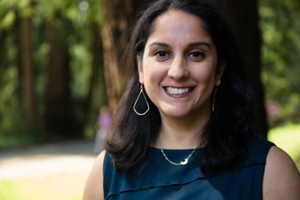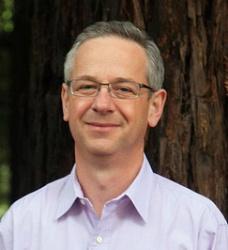Rachel Carson College Faculty Fellows

Sikina Jinnah is Rachel Carson College's new faculty chair!
The Chair of the Faculty is an Academic Senate member, other than the Provost, who is elected by the college Faculty to serve a two year term, and will serve as a member of the Executive Committee.
Dr. Jinnah is an Associate Professor in the Politics Department, an affiliated faculty member in the Environmental Studies Department, and a 2017 Andrew Carnegie Fellow. Her research focuses on the shifting locations of power and influence in global environmental governance, and in particular the role of transnational actors in environmental decision-making. Her most recent projects examine how key norms in global climate politics shape power relations, the role of U.S. preferential trade agreements in shaping environmental policy in trading partner nations, and the politics of climate engineering governance.

- Pronouns he, him, his, his, himself
- Title
- Distinguished Professor
- Division Physical & Biological Sciences Division
- Department
- Earth & Planetary Sciences Department
- Affiliations Anthropology Department, Ecology & Evolutionary Biology Department, Environmental Studies Department, Institute of Marine Sciences
- Office Location
- Earth & Marine Sciences, A115
- Mail Stop Earth and Planetary Sciences
- Faculty Areas of Expertise Paleontology, Geochemistry, Ecology, Earth Sciences, Climate Change
- Advisees, Grad Students, Researchers Adrienne Cherie Ricker, Maxwell Leclerc Pearson, ,
Summary of Expertise
Isotope biogeochemistry, paleobiology, ecology and evolution
Research Interests
Paul's research focuses on vertebrate paleoecology and evolution, which he places in environmental context through reconstruction of ancient ecosystems and climates. His work often includes biogeochemical analysis of animal tissues (teeth, bones, fur, skin, etc.) or environmental samples (soil minerals, fossil plants, etc.).
In recent years, Paul has worked in four broad areas. First, he has studied environmental change over the Cenozoic (the last 65 million years). He continues to explore the chronology and ecological consequences of the Paleocene-Eocene boundary thermal maximim (PETM) and other climatic events in the early Cenozoic. With his graduate students, he has reconstructed the topographic history of the western United States. Finally, with graduate students and other colleagues, he is reconstructing Holocene oceanographic changes along the California coast through biogeochemical records from mollusk shells.
A second major focus has been reconstruction of the paleoecology (e.g., diet, habitat preference, migratory behavior, etc.) of different groups of vertebrates. In some cases, Paul and his students have focused on evolutionary ecology, for example investigating the evolution of salt-water tolerance in crocodiles. In other cases, they've worked at an ecosystem scale, exploring how different members of a community exploit food resources or space. Much of this latter work has focused on Pleistocene communities. Paul is trying to understand the ecological factors that may have contributed to the collapse of these systems in the face of human exploitation over the past 40,000 years, as well as how these communities "worked" prior to their collapse.
An important related thread has been Conservation Paleobiology, using fossils from extant species to glean information of use for conservation planning. He and his students have a number of ongoing projects on seals and sea lions, lemurs, condors, and other species. They've discovered that some species behaved very differently in the recent past. They've tried to understand why behaviors have changed, and whether or not species might be able to "recover" their lost ecological potential. A major ongoing project on this front is exploring how environmental change over the past 10,000 years drove population level changes in the seals in the Ross Sea region of Antarctica.
Finally, a great deal of work in Paul's lab is now devoted to ecological studies of modern animals. Ecologists studying modern species have discovered that the biogeochemical methods developed to study ancient animals can provide insights into the ecology of living species, especially ones with behaviors or habitats that make them hard to observe or track (e.g., migratory birds, marine mammals, deep forest species). Beginning with Paul's early work on the ecology of living elephants, this work has expanded greatly (especially in the work of his graduate students and other colleagues) to include African carnivores, lemurs, sharks, and many different kinds of seals and sea lions. A major ongoing project on this front is a collaborative study with researcher Iliana Ruiz-Cooley and Ocean Sciences faculty member Matt McCarthy on the trophic level of sperm whales and how it has changed over the past century in response to environmental and anthropogenic forces.
Biography, Education and Training
B.A., University of Rochester
M.S., Ph.D., University of Michigan
Postdoc., National Museum of National History, Smithsonian Institution
Postdoc., Geophysical Laboratory, Carnegie Institution of Science
Honors, Awards and Grants
Charles Schuchert Award from the Paleontological Society, 1998
Fellow, Paleontological Society, 2005
Fellow, Geological Society of America, 2006
Fellow, California Academy of Sciences, 2013
Selected Publications
https://scholar.google.com/citations?user=BGzZ_egAAAAJ&hl=en
Teaching Interests
History of Life, Isotopes in Ecology and Paleoecology
